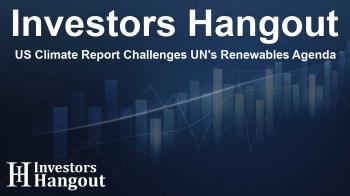US Climate Report Challenges UN's Renewables Agenda

US Department of Energy Takes a Bold Stand on Climate Report
The US Department of Energy (DOE) has recently published a revealing climate science report that raises questions about the established climate policies. According to Friends of Science Society, this report suggests a significant departure from traditional climate narratives, especially regarding the concept of decarbonization through electric vehicles (EVs) and renewable energy sources. In parallel, the United Nations has released its own report that advocates for a new era of renewables and electrification, prompting a clash of ideologies on climate and energy solutions.
The Upcoming Climate Conference and its Implications
As the global audience gears up for the forthcoming climate conference, the dynamic between the US and the UN will be scrutinized. The backdrop of this event, scheduled for November, showcases the US effort to reconsider its stance on climate regulations. Friends of Science Society highlights how the recent issuance of the climate report represents a seismic shift in the US's approach, suggesting that it is prepared to challenge the prevailing notions that have justified extensive regulations in the past.
Decoupling from Decarbonization
With the announcement from the EPA regarding the potential rescindment of the 'CO2 endangerment' finding, the US is making a concerted effort to dismantle what it deems as restrictive climate policies. The Friends of Science Society notes that this decision could lead to a more competitive landscape for the US economy, saving billions that have been earmarked for compliance with regulatory frameworks that many view as outdated.
Contrasting Views on Climate Policies
The juxtaposition between the US DOE report and the UN's latest climate assertions amplifies the ongoing debate on the practicality of achieving Net Zero emissions. While the UN's report advocates for an aggressive expansion of renewable energy sources, critics argue about the feasibility and economic implications of such a drastic transition. The Friends of Science Society emphasizes that the true discussion should center around the reliability and sustainability of renewables compared to traditional energy sources.
Expert Opinions in Climate Debates
Notably, the scientists behind the US report include influential figures such as Judith Curry and Steve Koonin, who have contributed significantly to the discourse on climate science. Their involvement signals an effort to ground the debate in comprehensive scientific evaluation rather than hyperbole. The report aims to address misconceptions that may cloud public perception of climate change.
Challenges and Innovations in Renewables
As the UN's narrative emphasizes the necessity of transitioning to all-renewable energy systems, experts have pointed out inherent challenges, especially regarding the reliability of wind and solar energy. Friends of Science Society argues that the current technology does not support the high energy demands of sectors like artificial intelligence, raising doubts about the practicality of the UN's recommendations.
Learning from Global Examples
Global case studies illustrate the complexities involved in mandating a rapid shift to renewables. Countries like the UK face rising electricity prices primarily due to aggressive renewable integration, spotlighting the unpredictability and expenses tied to renewable energy. As the US seeks to leverage its natural advantages in energy production, it positions itself as a leader that aims for pragmatic solutions to energy challenges.
Reflections from Friends of Science Society
Friends of Science Society, an organization dedicated to navigating the intricacies of climate science, champions the idea that the sun is a primary driver of climate patterns. Their perspective, based on thorough research, aligns with a call for a reevaluation of what constitutes effective climate policy. As the organization observes these impactful developments unfold in energy and climate discussions, they remain committed to offering insights that prioritize scientific integrity over political rhetoric.
Frequently Asked Questions
What is the main premise of the recent US DOE climate report?
The US DOE climate report challenges established climate dogmas and calls for a reevaluation of current narratives promoting decarbonization.
How does the US's stance on climate policy differ from that of the UN?
The US emphasizes practicality and economic impact, whereas the UN advocates for an aggressive transition to renewable energy without adequately addressing the associated challenges.
Who are some key scientists involved in the recent US climate report?
Prominent figures like Judith Curry and Steve Koonin contributed to the report, both of whom have significant expertise in climate science.
How might the EPA's rescindment of the 'CO2 endangerment' finding impact the US economy?
This action is expected to reduce regulatory burdens, potentially saving the US economy billions and increasing competitiveness in various industries.
What does Friends of Science Society advocate for regarding climate science?
They promote the idea that the sun is the primary driver of climate change, rather than solely attributing it to human-produced carbon dioxide.
About The Author
Contact Thomas Cooper privately here. Or send an email with ATTN: Thomas Cooper as the subject to contact@investorshangout.com.
About Investors Hangout
Investors Hangout is a leading online stock forum for financial discussion and learning, offering a wide range of free tools and resources. It draws in traders of all levels, who exchange market knowledge, investigate trading tactics, and keep an eye on industry developments in real time. Featuring financial articles, stock message boards, quotes, charts, company profiles, and live news updates. Through cooperative learning and a wealth of informational resources, it helps users from novices creating their first portfolios to experts honing their techniques. Join Investors Hangout today: https://investorshangout.com/
The content of this article is based on factual, publicly available information and does not represent legal, financial, or investment advice. Investors Hangout does not offer financial advice, and the author is not a licensed financial advisor. Consult a qualified advisor before making any financial or investment decisions based on this article. This article should not be considered advice to purchase, sell, or hold any securities or other investments. If any of the material provided here is inaccurate, please contact us for corrections.

